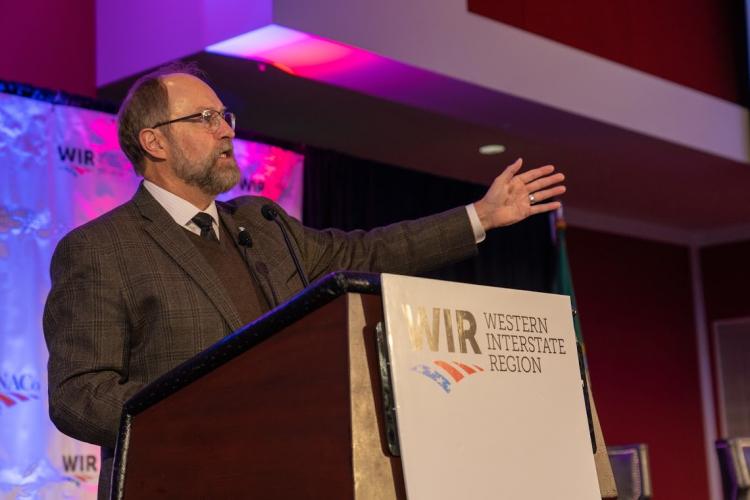Mariposa County Supervisor Cann: The Year Ahead as NACo WIR President
 Mariposa County Supervisor Kevin Cann was recently
sworn in as the 2019-20 President of NACo’s
Western Interstate Region (WIR). Supervisor Cann
spent some time discussing the top issues facing rural
counties as well as his priorities as President for the coming
year.
Mariposa County Supervisor Kevin Cann was recently
sworn in as the 2019-20 President of NACo’s
Western Interstate Region (WIR). Supervisor Cann
spent some time discussing the top issues facing rural
counties as well as his priorities as President for the coming
year.
What motivated you to want to lead NACO’s Western Interstate Region?
In 2013, while Chair of the Rural County Representatives of CA (RCRC), I was asked to learn more about this western-focused part of NACO so we could name a Board member to be one of California’s two Western Interstate Region (WIR) representatives. CSAC and RCRC long ago agreed to each name and finance a rep to WIR. I realized this organization could be a powerful voice, both in Washington, D.C., and with agencies and industries that impact our western counties and culture. I was pleased that my federal land management experience and more centrist views were welcomed by the group. I have been one of California’s two delegates to WIR since 2013 and after serving for a few years I became convinced that WIR, especially through its strategic partnerships, could be a premier national advocate for issues facing western counties.
What are the top issues currently facing counties in our western states?
While there are a number of issues which are common in the 15 WIR states, the fact that an overwhelming percentage of the 635 million acres of federally managed lands are in these states dominates our challenges. In most western counties 50 to 90 percent of the land is federally managed. Convincing Congress to maintain their obligation for federal Payments in Lieu of Taxes (PILT) annually demands significant effort from the group. Forest health, wildfire prevention and suppression, endangered species management, invasive species, rural broadband completion, access to federal lands, tourism and rural economic development all command focused energy. At times WIR also tries to help with more localized issues like wild horse and burro overpopulation.
Do you find the issues facing California Counties different or similar to those of our western counterparts?
One of the reasons I became so committed to WIR is that 90 percent of the advocacy directly impacts California and my home county of Mariposa. WIR’s reach is dramatically enhanced through our partnerships with like missioned organizations such as the Western Governors’ Association, the National Wildfire Leadership Council, and the National Endangered Species Act Coalition.
What have you learned while serving as a WIR officer over the past two years?
I’ve gained a deeper respect for the supervisors and commissioners across the 15 western states. We are all challenged with insufficient resources to meet ever changing demands. WIR helps us to benefit from each other’s experience and keep us from inventing the same wheels concurrently. By combining our voices with those of our strategic partners we become a powerful and generally successful advocate for western county issues.
As NACO WIR President, what are your top priorities for the coming year?
Over the past few years, WIR officers have formed very strong working relationships with US Forest Service (USFS) and Bureau of Land Management (BLM) officials at the highest levels. These agencies can no longer achieve their missions without successful working relationships with western counties. Old norms of exclusive jurisdiction on USFS and BLM lands must be exchanged for collaborative partnerships with strong recognition of local county priorities. We are making great progress on this front.
I am personally working with the Western Governors’ Association and the National Wildfire Leadership Council to add volume to WIR’s advocacy on PILT, innovative forest health solutions and final mile broadband.
Why is it important for western state counties to have a strong voice at the federal level?
I learned that Congress responds to coordinated multi-state advocacy. We have many champions on Capitol Hill who are willing to shepherd WIR priorities, which are of course their home state issues. There are many hands out for every federal dime allocated. It is essential that our voice and issues be well documented, supported and defended at the federal level with Congress, the agencies and through the judicial system when necessary. If we are ambivalent, western counties will suffer.
If there is one thing you would want to accomplish during your year as President, what would it be?
We have mustered bipartisan support and multiple pieces of current legislation for permanent funding of the federal PILT program. This half-billion dollar annual program impacts more than 1,850 counties in 49 states. Congress needs to remove PILT funding from the discretionary pot and place it back into the mandatory funding category where it was from 2008-14. PILT reimburses counties a minimal amount for the loss of tax and income producing opportunities on federal controlled lands in their counties. It is the right thing for the federal government to do. The current annual PILT funding dance with associated uncertainties leaves counties unable to efficiently plan for necessary services.
I am honored to have been chosen President of the WIR for the next year. I believe there is a new localism evolving as folks see more and more partisan legislative gridlock at the state and federal levels. At the county level, elected officials are responsible to residents on a daily basis. It is essential that we do everything possible as non-partisan representatives to impact state and federal legislation supportive of the challenges we face weekly.








































